Sep 8, 2025. European Tour Lecture (1) London
Hello. Today marks the first lecture of Venerable Pomnyun Sunim’s 2025 European tour, held in London.
The flight that departed from Incheon Airport at 10:25 PM last night landed at London Heathrow Airport at 7:40 AM local time after a stopover at Amsterdam Airport at 7:15 AM. Sunim caught some sleep on the plane overnight.
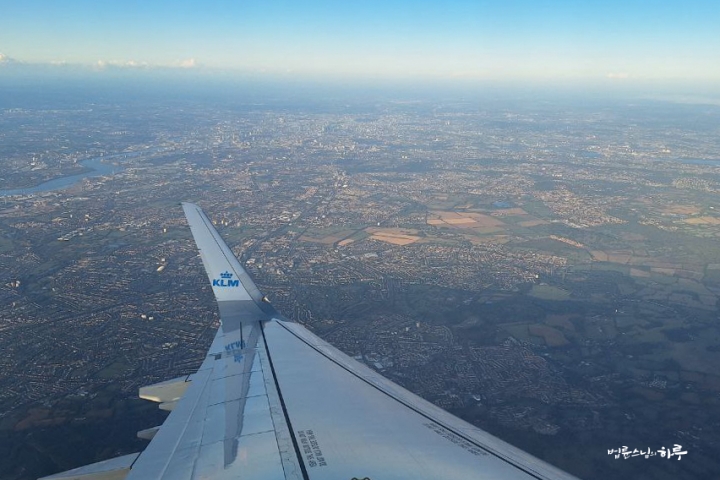
After collecting the luggage, Sunim left the airport after 8 AM. Members of London Jungto Society were there to warmly welcome him.
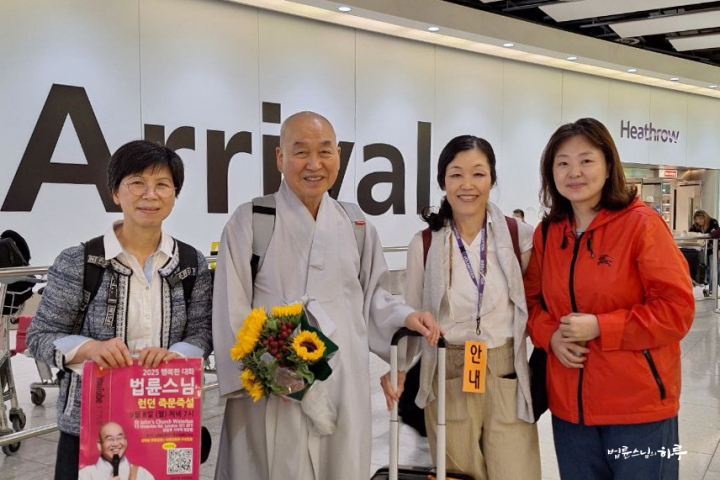
Leaving the airport, they headed straight to the accommodation. Due to a London Underground union strike, traffic was extremely congested in the city. It took 2 hours and 50 minutes to get from the airport to the accommodation. Originally, a meeting with the UK publisher of Sunim’s book was scheduled for 2 PM, but it was postponed to 4 PM.
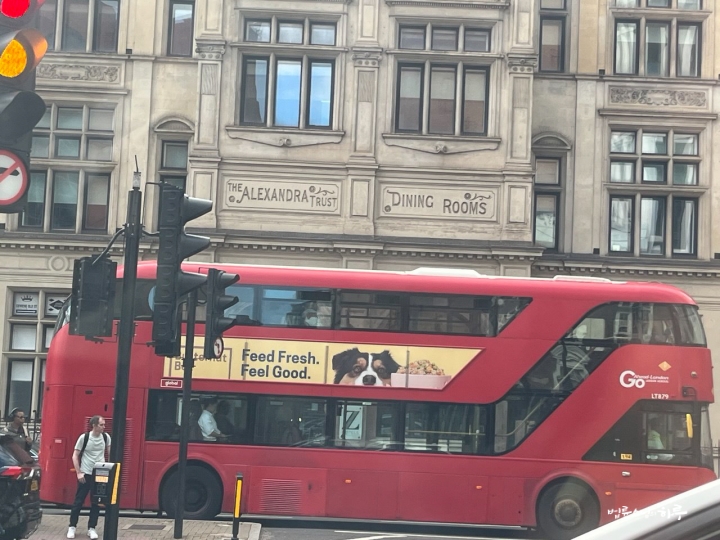
Today’s accommodation for Sunim is the home of Kim Nurri, a member of London Jungto Society. After unpacking at the accommodation, members of London Jungto Society greeted Sunim with three prostrations.
“Welcome. How have you been?”
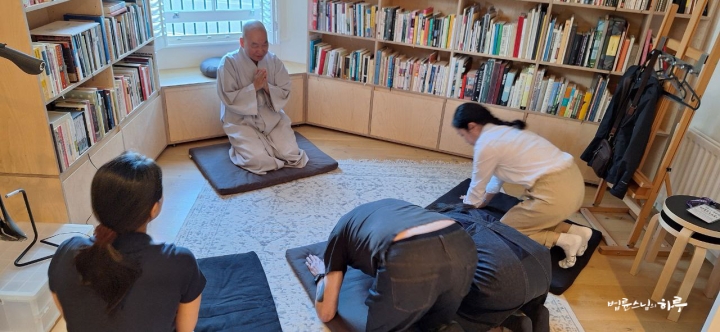
After receiving a report on the lecture preparations and having a quick lunch, they headed to the publisher.
At 4 PM, the meeting with the publisher began at Carmelite House, where many of the UK’s leading publishers are located.
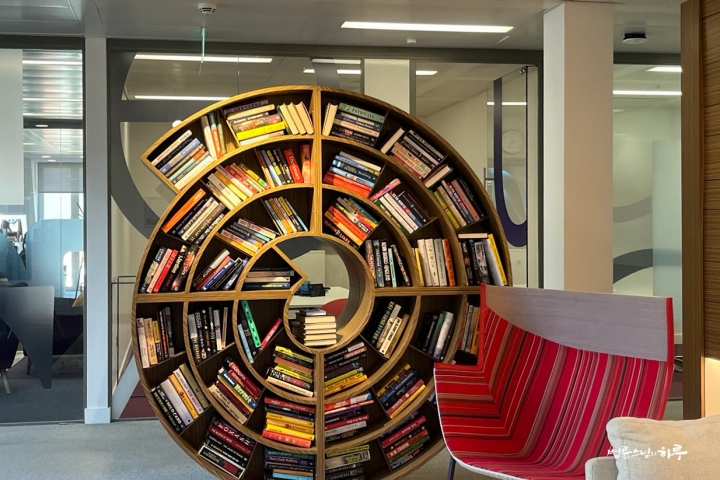
After discussing Sunim’s book for an hour with Emily, the publisher’s representative, they went up to the building’s rooftop overlooking the Thames River to continue their conversation.
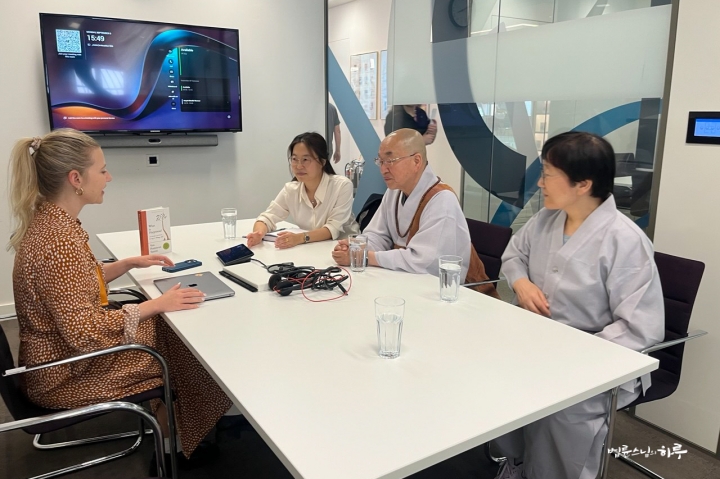
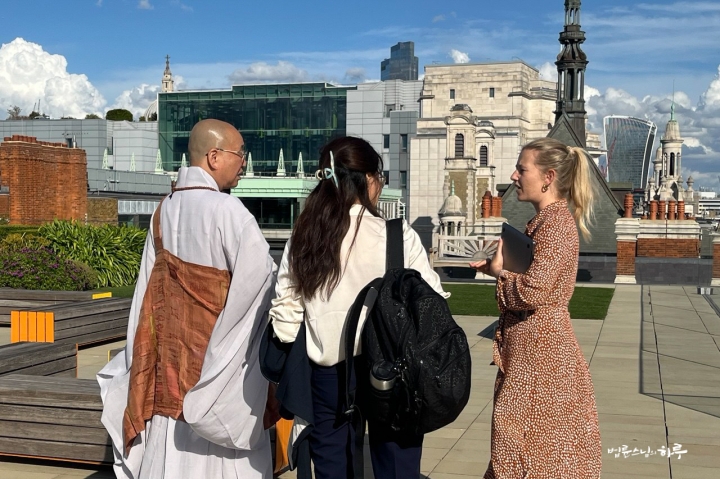
Since the lecture venue was close to the publisher, they headed straight there. Today’s lecture is being held at St John’s Church, Waterloo. Built in the 1820s in Greek Revival style, this historic church building now hosts cultural and artistic events alongside worship services. Today, Venerable Pomnyun Sunim’s Dharma Q&A was held here.
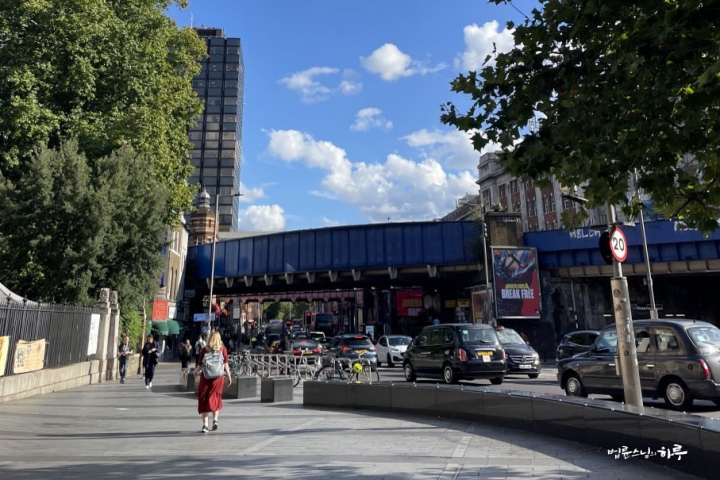
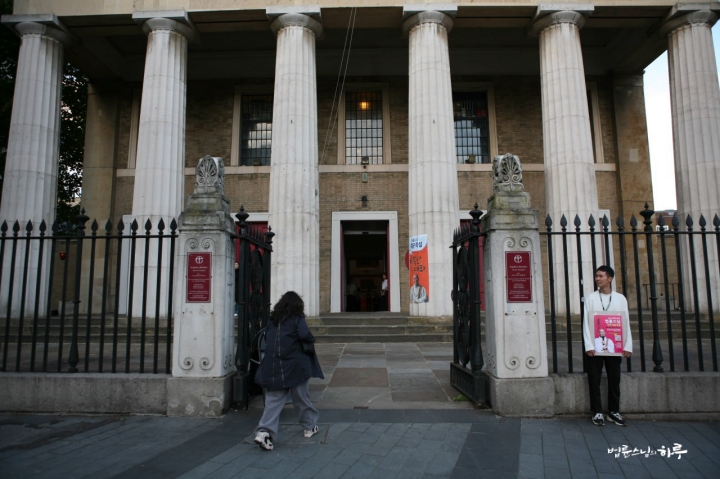
Upon arriving at the venue, Sunim warmly greeted the volunteers working in various roles throughout the space.
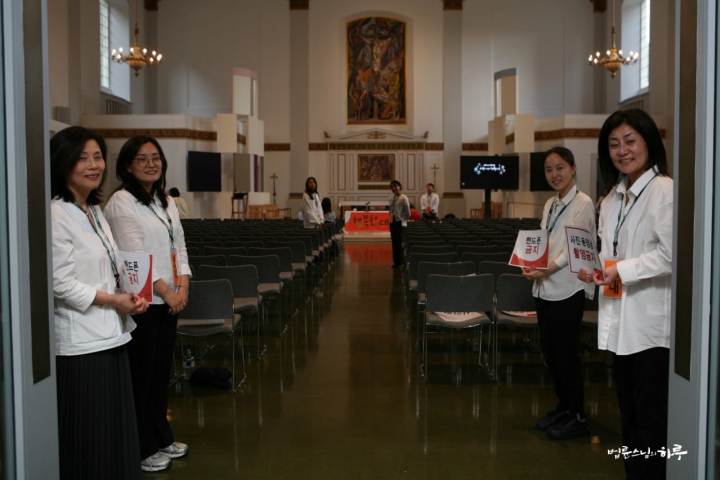
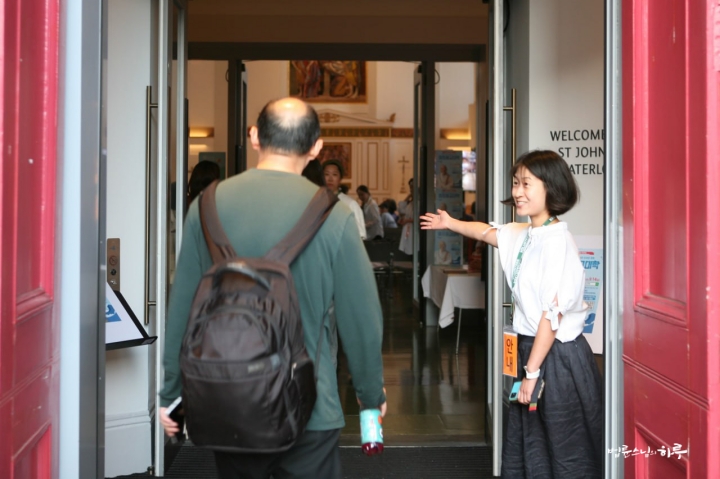
The London Dharma Q&A began at 7 PM. As Sunim appeared before the audience of about 250 people, enthusiastic cheers and applause erupted.
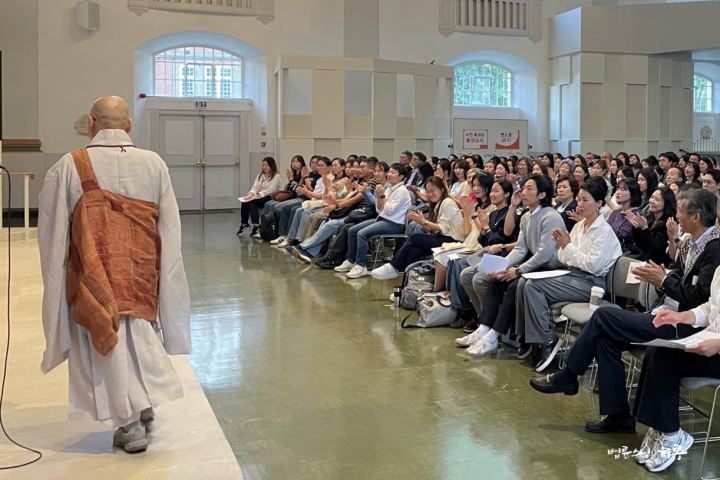
First, Sunim greeted everyone with a smile.
“The weather in London is quite nice.”
“Yes.”
“Until yesterday, Korea was still hot. The temperature rose to 33 degrees Celsius, feeling like summer weather. Moreover, this summer saw heavy rains in many areas causing flood damage, and Gangneung is experiencing an unprecedented drought making even water supply difficult. The damage from climate change seems very serious. As I came to London, I heard that Londoners joke that climate change is making British weather better. Have you heard such stories?”
“Yes.”
“Coming here, I notice that despite the oceanic climate, it doesn’t feel humid due to climate change. It feels clear and dry like Mediterranean weather. Since the entire Earth’s climate is changing, if there are areas that suffer, there must be areas that benefit. Siberia might be developed as farmland in the future.”
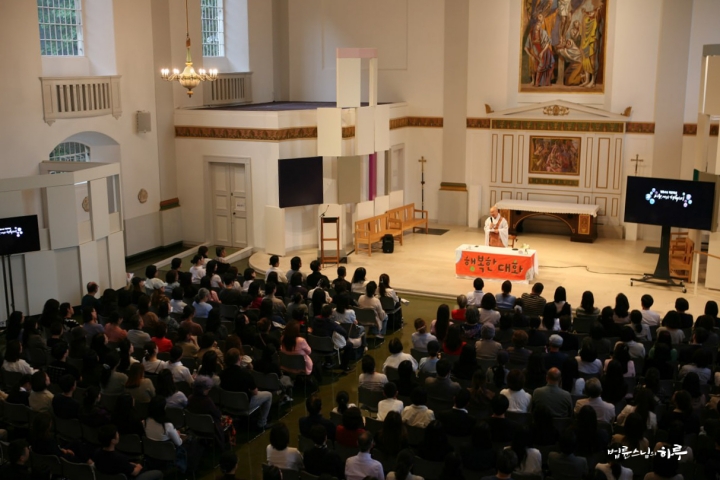
The Climate Crisis Brought on by Consumer Addiction – Why Can’t We Stop?
Looking at the Earth as a whole, climate change brings changes in vegetation, which leads to the extinction or migration of various species. The species that lives most advantageously under current climate conditions is us humans. So climate change can be seen as a major threat to humanity. However, climate change doesn’t mean the end of the Earth. The Earth won’t end just because the human species disappears.
Despite various warning signs appearing, we cannot stop consuming. Consumption is similar to drugs. Once addicted, it’s extremely difficult to quit. You probably feel this too. When you walk and then ride a bicycle, it becomes difficult to go back to walking. When you ride a bicycle and then ride a motorcycle, it’s hard to go back to cycling. When you ride a motorcycle and then drive a car, it’s difficult to go back to riding a motorcycle. Once you get used to living comfortably and quickly, it’s very hard to go back. Only when reaching the dead end of death do people finally come to their senses. Even smokers only quit when shown pictures of blackened lungs and told of the risk of death. Until seeing it that directly, they keep quitting and starting again even while knowing it’s bad for their health. While drugs are said to be the most addictive, in my view, consumer addiction seems the most serious. Since the value system has formed that ‘producing a lot and consuming a lot is living well,’ people don’t think overconsumption is bad but rather envy it. That’s why it’s difficult to fix. While people can’t quit alcohol or cigarettes even knowing they’re harmful to health, consumption is rather seen as good and becomes an object of envy, making it even harder to stop.
In the Era of Climate Crisis, the Overconsumption of the Wealthy Is a Serious Crime
From the perspective of climate change, the wealthy who engage in overconsumption can be considered serious criminals. Of course, being wealthy doesn’t necessarily mean consuming a lot. Ownership and consumption are somewhat different. Some people live frugally despite having a lot of wealth. However, on average, the wealthy who consume a lot can be said to be the biggest criminals putting humanity at risk in the climate crisis era. Yet don’t you envy such people? That’s why this problem seems difficult to improve. Humanity might change when reaching a moment of death crisis, but currently, while there are many signs of climate crisis, human consumption is expanding even more. This is because the climate crisis isn’t yet at a level that threatens immediate survival. Aren’t people in London saying it’s actually become more pleasant to live here? In this situation, I think it will be somewhat difficult to solve the climate crisis problem.”
Sunim stood and lectured for 2 hours despite his bad knee joints, saying he couldn’t see the audience’s faces well. Five people had pre-registered questions for dialogue, and then 2 more people raised their hands on-site to ask Sunim questions. One of them asked for Sunim’s advice on how to practice the teaching of not dwelling on the past in daily life, as they felt confused hearing people tell them not to dwell on the past when memories of past wounds don’t easily disappear and feelings of injustice remain.
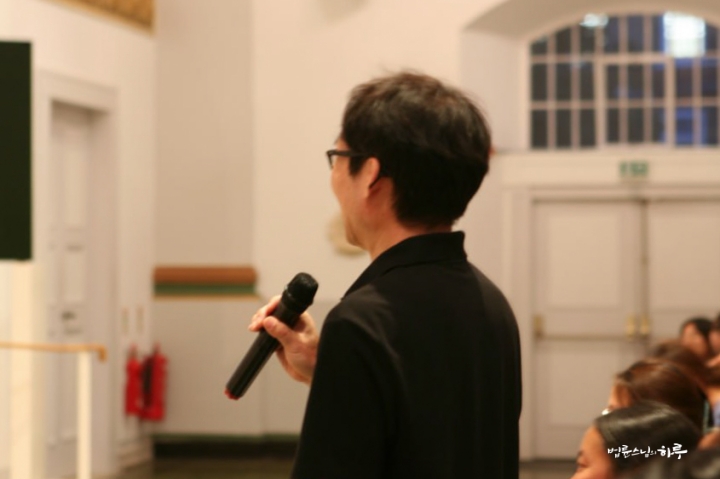
How Can I Not Dwell on the Past When the Wounds Are Still There?
“Then I’ll teach you to ‘dwell on the past.’ From now on, try chanting ‘dwell on the past’ and make an effort. If not dwelling on the past isn’t acceptable to you, then dwell on the past. (laughter)”
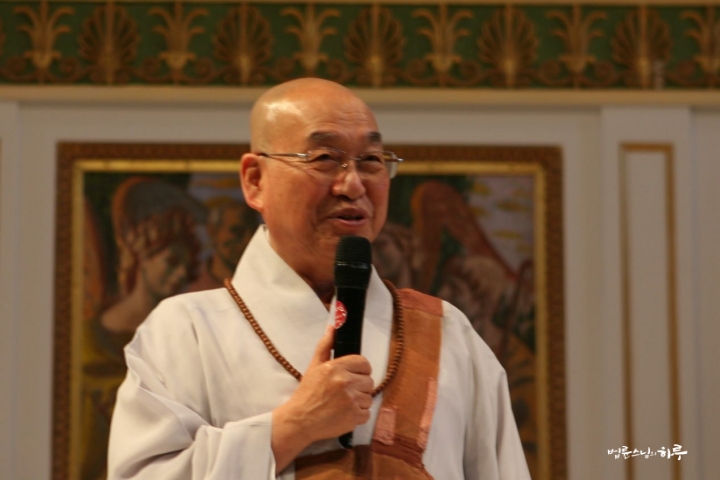
“It’s the same principle as when someone says ‘Let go of this,’ and they respond ‘How can I let go of this? I can’t let it go.’ In such cases, you just say ‘Then just keep holding it.’ How easy is that? Similarly, I’m telling you to ‘dwell on the past.'”
“My question is about how to practice not dwelling on the past. Of course, dwelling on the past is easy, but I’m asking for a method not to dwell because I know from experience that it brings suffering.”
“You said that not dwelling on the past brings you suffering. Since suffering follows either way, try dwelling on the past.”
“It’s too difficult.”
“You seem to be overthinking. For example, let’s say someone kidnapped me and tried to force me into sex trafficking or forced labor. When I refused, they forcibly injected me with drugs. At first, I tried not to get injected, but after repeated injections, I eventually became addicted. Later, I started asking for drugs myself. I said I would do anything they asked if they gave me drugs. Then I was discovered by police and freed from confinement. Now that I’m free, will everything return to normal? No. The drug dependency remaining in my body doesn’t disappear. Eventually, I secretly try to obtain drugs again and get caught. At this point, can I claim ‘I was previously kidnapped and forcibly injected with drugs, so it’s not my responsibility’? Regardless of the cause, is the problem now that I’m addicted to drugs, or is the problem the person who kidnapped me and administered the drugs?”
“If it were me, I would argue that taking drugs initially wasn’t my choice.”
“Would the law recognize the claim that I’m not a drug offender because I didn’t want to take drugs but someone else forcibly injected me?”
“That would feel so unfair.”
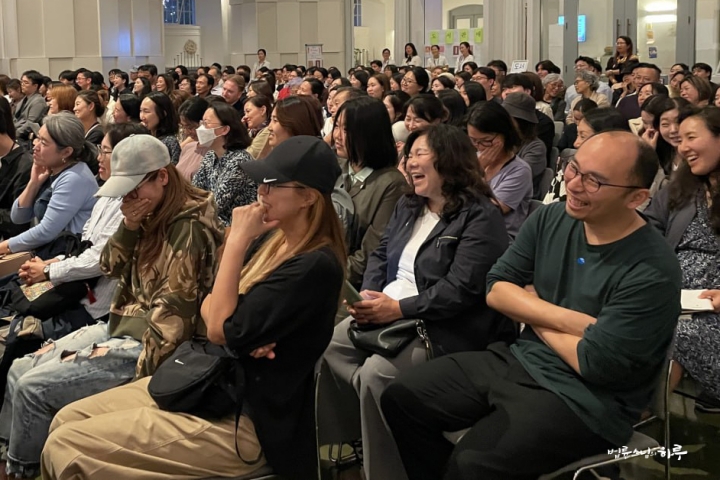
“Of course it would be unfair. But legally, is this person a drug offender or not?”
“If legally judged as a drug offender, there’s nothing I can do, but I would try my best to argue my situation for maximum leniency.”
“Let me ask again. Is that person the drug addict, or is the person who gave the injection the drug addict?”
“That person is the drug addict.”
“Then to overcome this, should you overcome it yourself? Or should someone else overcome it for you?”
“You have to overcome it yourself.”
“But if you keep blaming the past, saying it’s a problem caused by someone else injecting you with drugs, does that help or hinder you in overcoming drug addiction?”
“If I just feel wronged and neglect treatment, it wouldn’t help.”
“That’s right. Regardless of where the cause started, the person currently addicted to drugs is myself. So this is my problem. I have to overcome it. Talking ten thousand times about how my drug addiction started because of someone else in the past doesn’t help me treat my drug addiction now. ‘However it started, whoever caused it to start, this is now my problem, and I must overcome my problem.’ Thinking this way helps treatment even a little bit.”
“Let me give another example. Let’s say you were sexually harassed 10 years ago and the emotional wound remains. If your whole body still trembles when a man approaches, if you’re startled even when your boyfriend just puts his hand on your shoulder, and you feel uncomfortable in relationships, who is tormenting you now – the past perpetrator or yourself?”
“It seems like being trapped in one’s own thoughts.”
“The important thing is that regardless of how it started, in the current situation, it’s my problem. If past experiences negatively affect my current and future life, I shouldn’t be bound by that past. Because being tied to the past harms my current life and future.”
“If that past incident is related to a specific space, would it be wise to leave that space? Or should I develop my mental strength wherever I am? If harm is still continuing in that space, of course it needs to be resolved. But if the perpetrator has gone to prison or already died, they cannot affect my healing. Holding the perpetrator accountable and my healing are separate matters. Catching and punishing the person who sexually assaulted me 10 years ago, putting them in prison and holding them accountable is necessary for social justice. But doing so doesn’t heal me.”
“Should I understand this as saying to value myself the most?”
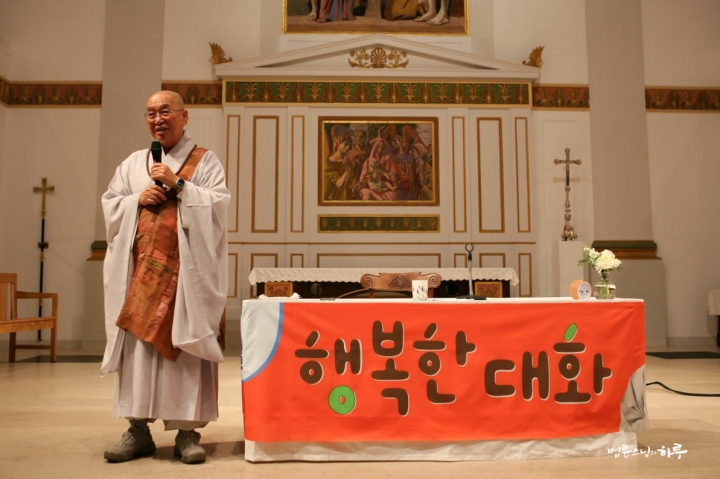
“No. I’m saying that if the past becomes an obstacle to the present and future, you must let go of that past. If recalling past memories doesn’t bring up anger but you can be calm enough to think ‘that happened,’ when healing reaches that point, the experience can actually be helpful. The past then acts to help your current and future life. When someone else says they were sexually assaulted, you can understand and empathize with them more deeply, and by sharing your experience of overcoming, you can give that person hope. The moment of experiencing it may be unfortunate, but if you overcome it, it can become beneficial to you.
“At what point can we say we’ve overcome it?”
“You can say you’ve overcome it when that experience no longer becomes an obstacle to your present and future.”
“Yes, I understand.”
“Not dwelling on the past doesn’t mean ignoring it or not talking about it. If I were sexually harassed and spent all night crying at home, who would that help? It would only waste my precious time and create more laundry from wet pillows. If I don’t report it out of shame, it doesn’t help social justice either. Reporting should be done not for revenge, but to prevent recurrence and establish social justice. Revenge actually doesn’t help me at all. For example, if a sexual harasser receives a 10-year sentence, it means my damage was that severe, but that alone cannot heal the wound. I need to accept the sexual harassment as an incident, overcome it, and have the perspective of reporting and punishing the perpetrator for social justice so that such harm doesn’t happen to others.
However, from a spiritual practice perspective, we shouldn’t dwell on the past. Let’s say you were deeply hurt as a child because your parents hit and cursed at you. If you live hating your parents because of that, it makes you unhappy. I’m not saying to forget that the child was hurt. If that wound makes your present and future unhappy, then you need to overcome it. The wound isn’t healed just because your mother apologizes saying ‘I’m sorry I hit you back then.’ Your mother probably doesn’t even know she hurt her child then. She’ll likely say, ‘I did it all for your own good, not to harm you.’ Being healed through your mother’s apology is not spiritual practice. Healing comes when you understand the wounds from your mother in childhood by thinking, ‘How difficult and hard must my mother’s life have been to hit and curse at her own child like that? Thinking about my mother’s mental state at that time, I can see how it could have happened.’ This is how you must heal your own wounds. No one else can heal them for you. Because everyone is too busy living their own lives.”
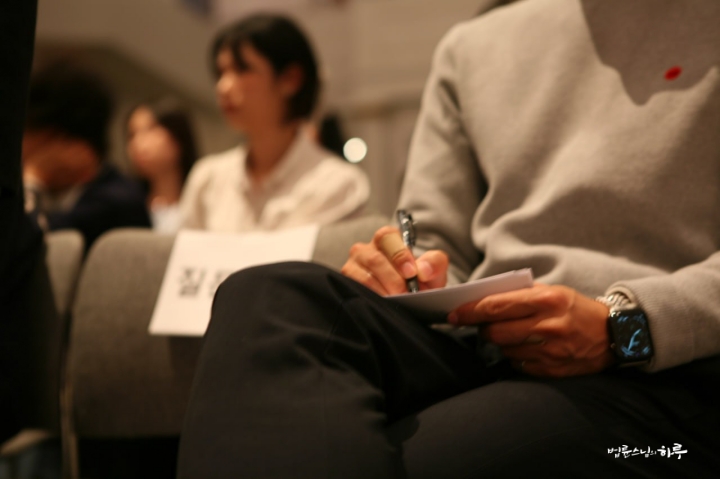
“I will keep your words in mind. Thank you.”
“What Jesus said about loving your enemies is in line with this principle. Hating your enemies is something everyone in the world does. By doing so, you cannot escape from the cycle of resentment. If you believe in God, shouldn’t you take the path to escape from such a cycle? Loving your enemies doesn’t mean liking them, but rather freeing yourself from resentment and hatred.”
Questions continued to follow.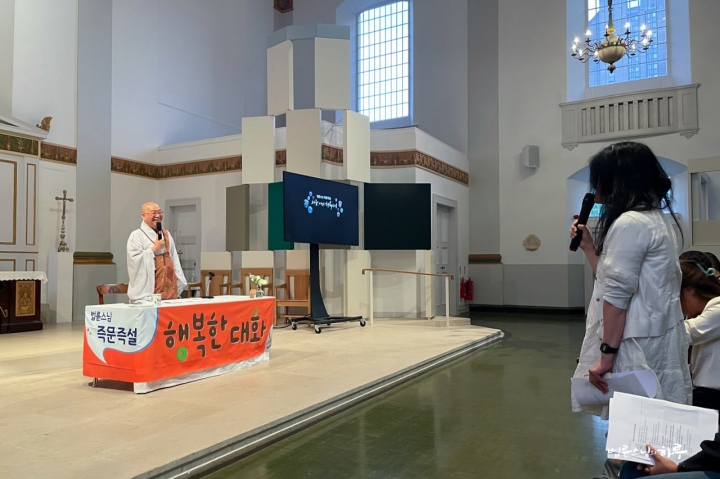
I’ve been used to living independently since childhood, and I came to the UK and got married internationally. However, after conflicts arose with my mother-in-law, things became uncomfortable with my husband too. How should I resolve this?
I’ve been in the UK for about 3 years and got a job, but I still feel the language barrier. Yet I don’t have confidence to return to Korea and do well either, so I feel anxious.
How can I know that I’ve tried everything before running away? What’s the difference between failing and giving up?
After I went through depression, my daughter also suffered from depression as a result. How should I deal with this guilt and worry?
After my wife was diagnosed with terminal cancer, I feel lost about how to live with my young children going forward.
I’m afraid of death. Are you afraid of death too, Sunim? How can I overcome the fear of death?
After the dialogue, Sunim gave closing remarks for the lecture.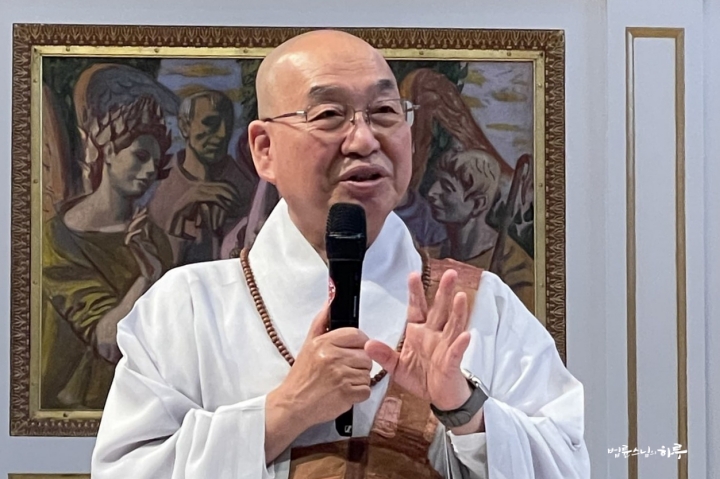
“Just as physical illness can be cured with treatment, our minds can also live without suffering if we take care of them a little when they’re troubled. That’s why listening to Dharma Q&A is helpful, but it would also be very beneficial to learn more about how to make yourself happy at Happiness School, or to study the basic principles of how the mind works and how thought systems are formed at Jungto Dharma School. Through this study of the mind, I hope all of you can live happily regardless of your religion or where you live.”
After the lecture, a book signing session continued on stage. People lined up holding their books to their chests as if they were precious treasures. Sunim made eye contact with people, and people made eye contact with Sunim as they exchanged a few words.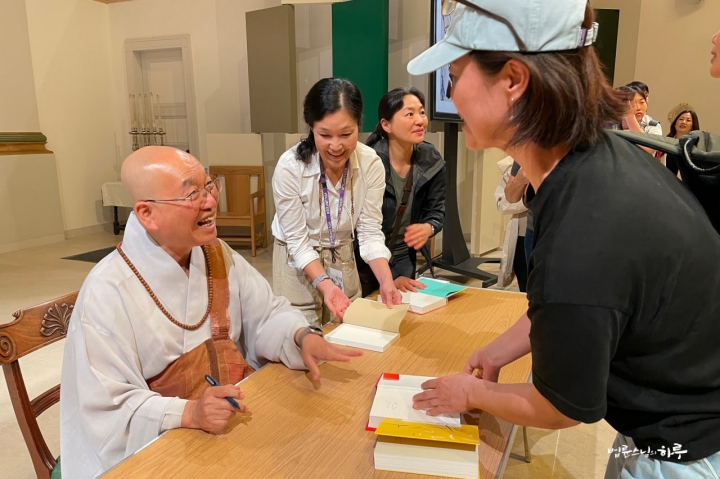
At the back of the lecture hall, people continued to buy books and line up. The signing session seemed endless.
After all attendees had left the lecture hall, Sunim took a commemorative photo with the volunteers who had prepared the lecture.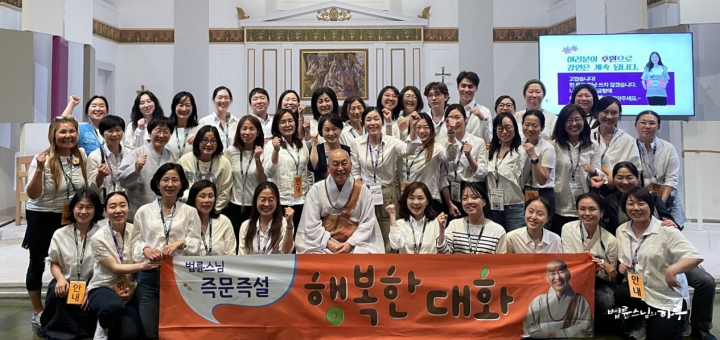
After greeting the volunteers, Sunim left the lecture hall, and the volunteers had a mindful sharing session with Dharma Teacher Myodeok. The lecture hall could only be used until 10 PM, and they had to put away 150 of the 250 chairs they had prepared. In just 10 minutes, the volunteers took turns briefly sharing their feelings.
“After only seeing you online, meeting you in person feels like encountering a full moon – I’m returning home with bright and warm energy in my heart.”
“When my body was tired and I lay down briefly, seeing Sunim standing and lecturing until the end made me realize my weakness and Sunim’s strength once again.”
“Like the saying ‘even a sheet of paper is lighter when lifted together,’ it wasn’t hard at all because we shared the work.”
Both first-time volunteers and experienced volunteers expressed much gratitude for the time spent together.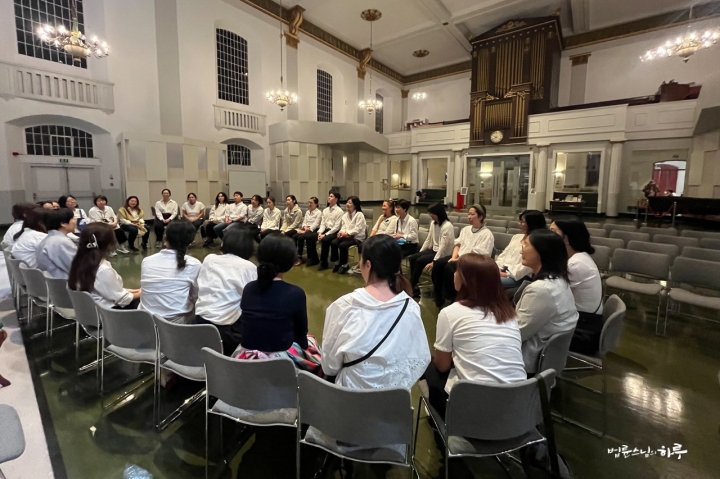
Returning to the accommodation, it was 10 PM. Sunim presented his books as gifts to express gratitude to Kim Nurri and Adam, the couple who prepared the accommodation and meals, Jeon Hyunmi who coordinated the London lecture, and Chu Heesook who coordinated all the European lectures.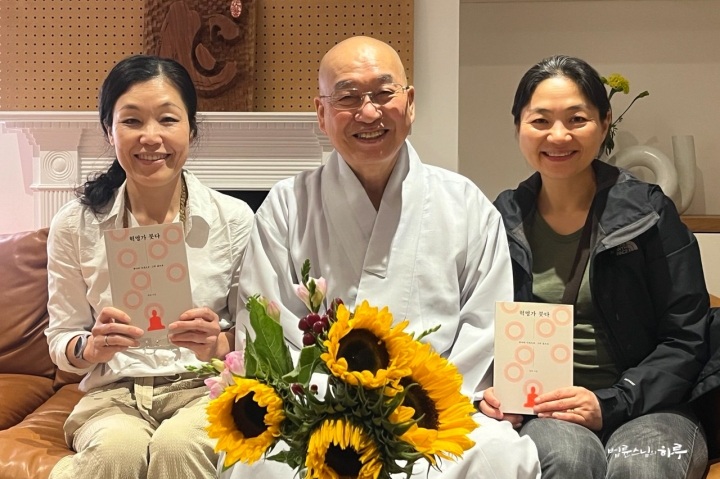
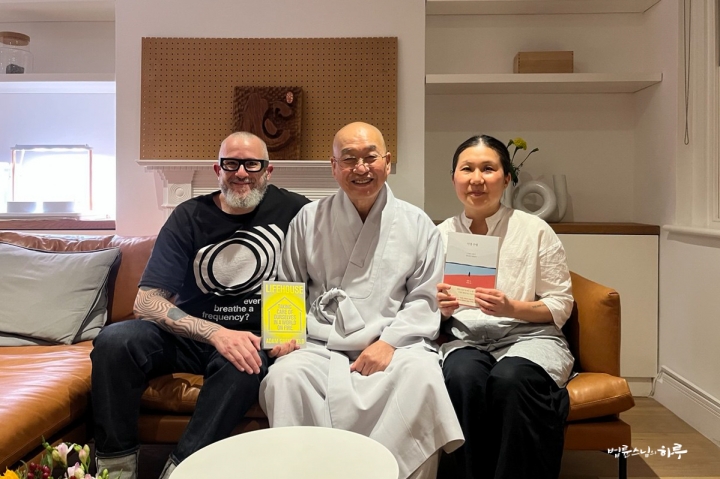
Sunim finished the day’s activities after proofreading manuscripts and handling several tasks. He successfully completed the first lecture in Europe.
Tomorrow, he will wake up at 4 AM to take a train to Paris, France. In the afternoon, he will give a Dharma Q&A lecture with French interpretation for locals, and in the evening, he will continue with the second European tour lecture for Korean expatriates.





